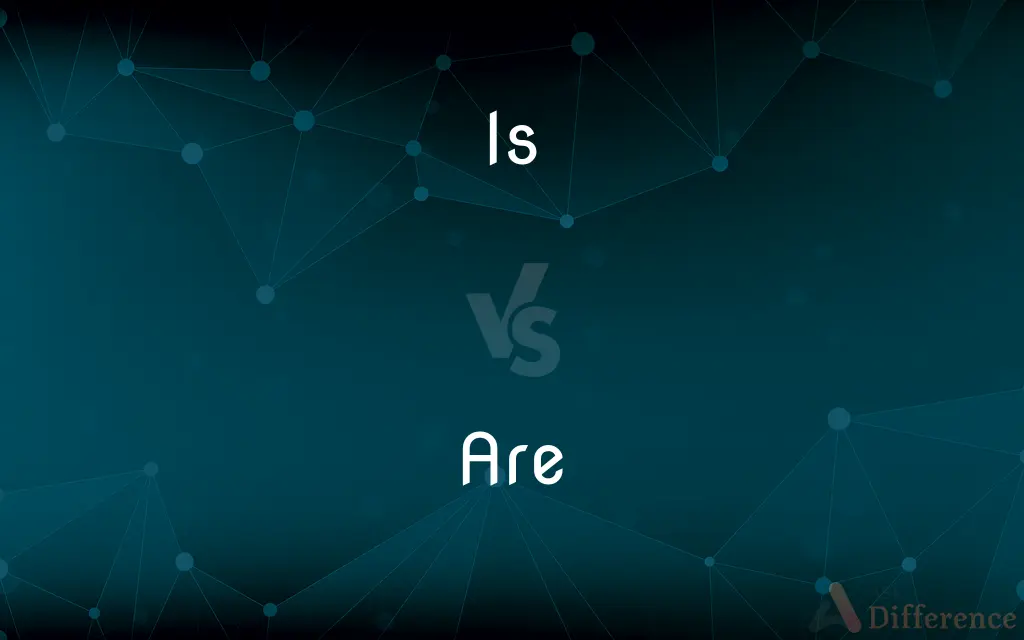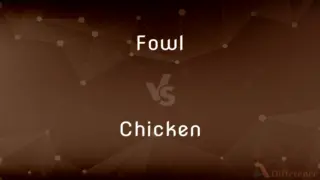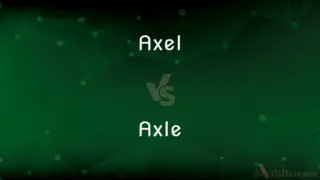Is vs. Are — What's the Difference?
Edited by Tayyaba Rehman — By Fiza Rafique — Updated on November 2, 2023
"Is" is the third-person singular present form of "be," used with singular subjects. "Are" is the second-person singular and plural, and first/third-person plural present form of "be," used with plural subjects.

Difference Between Is and Are
Table of Contents
ADVERTISEMENT
Key Differences
"Is" is the present tense singular form of the verb "to be," used with singular subjects. For example, "He is happy." Conversely, "Are" is used with plural subjects or with "you," as in "They are happy."
In grammar, "is" signifies a state of being for a single entity. It indicates a condition or existence. For instance, "The cat is on the mat." "Are," however, applies to multiple entities, as in "The cats are on the mat."
"Is" often pairs with singular nouns or pronouns like he, she, or it. It denotes a singular action or state. On the other hand, "are" pairs with plural nouns or with "you," reflecting a collective action or state.
In questions, "is" and "are" change positions with the subject. "Is" for singular: "Is the book on the table?" "Are" for plural or "you": "Are the books on the table?"
"Is" and "are" are both forms of the versatile verb "to be," expressing existence, identity, or condition. Their correct usage is essential for grammatical accuracy in English.
ADVERTISEMENT
Comparison Chart
Subject Agreement
Singular
Plural or "You"
Pronouns Used With
He, She, It
You, We, They
Example Subjects
"The cat," "She"
"The cats," "They"
Usage in Questions
"Is the cat sleeping?"
"Are the cats sleeping?"
Expresses
Singular state or action
Plural state or action
Compare with Definitions
Is
Indicates existence or presence.
The solution is clear.
Are
Second-person singular and plural present of "be."
You are welcome.
Is
Describes a characteristic.
The sky is blue.
Are
Indicates existence or presence in plural.
The flowers are blooming.
Is
Forms the passive voice.
The cake is baked.
Are
Describes characteristics of multiple subjects.
They are fast runners.
Is
Third-person singular present of "be."
She is a teacher.
Are
First and third-person plural present of "be."
We are friends.
Is
Shows a state of being.
He is tired.
Are
Used in forming questions with plural subjects.
Are the dogs fed?
Is
Third person singular present indicative of be.
Are
A metric unit of measurement, equal to 100 square metres.
Is
Used in phrases with existential there when the semantic subject is a third-person plural.
There is three of them there.
Are
Second person singular and plural and first and third person plural present indicative of be.
Is
(Geordie) me.
Are
A metric unit of area equal to 100 square meters (119.6 square yards).
Is
(rare) i's.
Are
Inflection of be
Mary, where are you going?
Is
The third person singular of the substantive verb be, in the indicative mood, present tense; as, he is; he is a man. See Be.
For thy is I come, and eke Alain.
Aye is thou merry.
To-morrow is the new moon.
Are
Inflection of be
We are not coming.
Are
Inflection of be
Mary and John, are you listening?
Are
Inflection of be
They are here somewhere.
Are
Inflection of be
Are
(rare) An accepted (but deprecated and rarely used) metric unit of area equal to 100 square metres, or a former unit of approximately the same extent. Symbol: a.
Are
The present indicative plural of the substantive verb to be; but etymologically a different word from be, or was. Am, art, are, and is, all come from the root as.
Are
The unit of superficial measure, being a square of which each side is ten meters in length; 100 square meters, or about 119.6 square yards.
Are
A unit of surface area equal to 100 square meters
Common Curiosities
Is "is" used with the pronoun "I"?
No, use "am" with "I."
Can "is" and "are" be interchangeable?
No, they serve different grammatical functions.
Can "are" be used with singular nouns?
No, except when using "you."
Can "is" ever be used with plural subjects?
No, "is" is strictly for singular subjects.
When do I use "is" in a sentence?
Use "is" with singular nouns or pronouns.
In which situations do I use "are"?
Use "are" with plural nouns, pronouns, or with "you."
Do "is" and "are" have past tense forms?
Yes, "was" for "is" and "were" for "are."
Does the verb tense change between "is" and "are"?
No, both are in the present tense.
Are "is" and "are" forms of the same verb?
Yes, both are forms of the verb "to be."
How do I choose between "is" and "are" in a sentence?
Consider the subject's number (singular or plural).
Is it correct to say "There is two options"?
No, it should be "There are two options."
Can "are" be used in singular form with collective nouns?
Yes, if the collective noun is treated as a group of individuals.
Is it ever acceptable to use "is" with "you"?
No, always use "are" with "you," regardless of singular or plural.
Can "is" and "are" be used in passive sentences?
Yes, both can form passive constructions.
Are there exceptions to the rules for "is" and "are"?
Generally, no, but context and subject agreement are key.
Share Your Discovery

Previous Comparison
Fowl vs. Chicken
Next Comparison
Axel vs. AxleAuthor Spotlight
Written by
Fiza RafiqueFiza Rafique is a skilled content writer at AskDifference.com, where she meticulously refines and enhances written pieces. Drawing from her vast editorial expertise, Fiza ensures clarity, accuracy, and precision in every article. Passionate about language, she continually seeks to elevate the quality of content for readers worldwide.
Edited by
Tayyaba RehmanTayyaba Rehman is a distinguished writer, currently serving as a primary contributor to askdifference.com. As a researcher in semantics and etymology, Tayyaba's passion for the complexity of languages and their distinctions has found a perfect home on the platform. Tayyaba delves into the intricacies of language, distinguishing between commonly confused words and phrases, thereby providing clarity for readers worldwide.














































